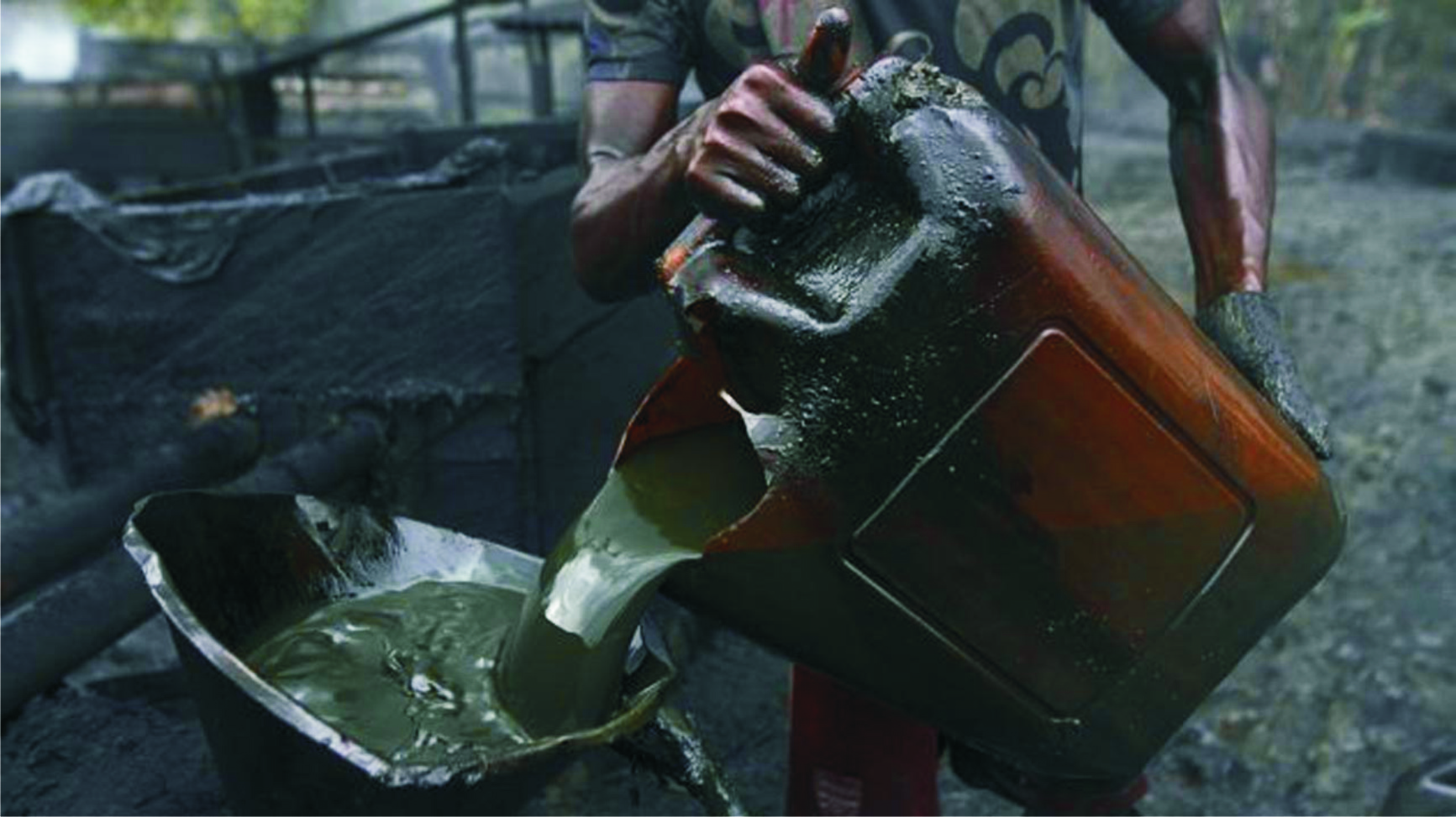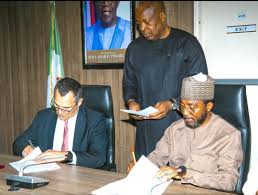News
Oil Theft: NEITI Calls For Review Of Legislation

The Nigerian Extractive Industry Transparent Initiative, NEITI, yesterday, called for a review of legislation and use of sophisticated technology in the oil and gas sector to reduce vandalism of pipelines, crude oil theft and illegal refining of crude.
This was part of the recommendations presented by the Executive Secretary, NEITI, Wazir Adio, in a document called, ‘The Inaugural NEITI Policy Dialogue with the theme, ‘Stemming Oil Theft in Nigeria’.
According to Adio crude oil theft happens in three ways. First, through vandalism and sabotage- when that happens crude oil is pilled and lost. Once that happens you have to short in production, and on the account of that it leads to secondly, Differed Production and this is different from loss when you are thinking of the first instance. The third part is outright theft.
He further disclosed that between 2014 and 2016, NNPC lone spent N363 billion for repairs and maintenance and that was on the average per year and that is about $400 million, and that also impacts the environment including livelihoods.
He also said an estimated range 150,000 bpd to 400, 000 being daily production is lost every day, which according to him between January and June of 2019, 22 million barrels of oil were lost and that in monetary value is $1.35 billion and that is five per cent of the 2019 budget, which put together is higher than the total allocation for health, education, defense, and Agric.
He added that the issue has been lingering for some time and goes beyond 2019 and that the total losses for 10 years (2009-2018) are $41.94 billion, and this is just the least and there is the possibility of much than this.
He said: “The current legislation to punish culprits is outdated, which if convicted the fine ranges between N100 to N5000, even the ones with jail terms have option of fine, but there is one that carries death penalty on refined products and not on crude. Stakeholders should do more on legislations, security, surveillance, community engagements, and diplomatic outreach.
“Yes a lot has been done but the problem still remains and that means look at the approach taken so far and see whether this is enough.
“The scale of infrastructure is amazing makes it difficult for police. An active market for stolen crude oil and we have to think about how to tackle it. We have to look at the legislation. The cost of those who perpetrate the act is low and they are bent on carrying out the crime.
“We must leverage on technology and deploy it including fingerprinting, molecular markers, revamp security architecture, specialized force, and communities need to be served, and allow incentives to communities by equity, and also involve the global community and make them understand it is not a Nigerian problem, which we need to have a global coalition.
Meanwhile, the Governor of Edo State, Godwin Obaseki, who was Guest of Honour at the occasion, urged the federal government to consider leasing of pipelines and also transparent surveillance contracts.
“The federal government should reconsider leasing these lines for a short while because we understand what is going on from the current owners and working with them, put in place security arrangements and infrastructural development plan for these lines because these lines are quite old and need to be replaced. Haven take over these lines we should now have proper transparent surveillance contracts”, Obaseki said.
However, he said the issue of crude oil theft is not a problem that can be eliminated in a hurry but must be tackled, hence the task is a collective responsibility.
He also urged governors in the Niger Delta region to properly utilize the 13 per cent derivation from the federal government to develop their states and give the people a sense of belonging.
The Minister of State, Petroleum, Timipre Sylva, represented by his Special Adviser, Felix Nabena, said in a goodwill message, said that “It is in the light of the above we welcome and identify with NEITI policy dialogue on combating crude oil theft in Nigeria.
The recent NEITI study and report on crude oil theft between 2009 and 2018 reveal a whooping sum of $41.9 billion worth of crude may have been stolen in the past 10 years.
“This calls for serious concern. Consequently, we must continue to review current efforts, law, solutions and some of them contained in the NIETI report. I, therefore, charge all stakeholders to reflect over this challenge persistently before us, the NEITI report and its recommendations.
Also in a goodwill message, the Group Managing Director, Nigerian National Petroleum Corporation, NNPC, Mele Kolo Kyari, represented by the Chief Operating Officer, Upstream, Roland Ewubare, disclosed that the Corporation has bear the brunt of crude oil theft, recording between 2001 and 2019 half-year a total of 45, 347 pipeline breaks on its downstream pipeline network.
“Sadly, today crude oil theft has become a major threat and that threat actually affects our economy in terms of our ability to meet our revenue projections and scale.
“NNPC as a player on the downstream side has felt the direct brunt of many attacks on our facilities and assets. Between 2001 and 2019 half year we recorded a total of 45, 347 pipeline breaks on our downstream pipeline network. It comes with an average of seven incidents on a daily basis.
“There is also environmental degradation caused by theft and pipeline vandalism and the environmental impact witnessed in communities is directly linked with this”, Ewubare said.
News
FG Targets Production Of Locally Made Vehicles By Dec
The Minister of Industry, Trade and Investment, Dr Doris Uzoka-Anite, has affirmed that Nigeria now has the capacity and materials to manufacture Made-In-Nigeria cars for local use and export.
With the enabling environment being provided by the government, she said manufacturers should be held responsible if the cars are not rolling out by December 2024.
Currently, Nigeria produces less than 10 per cent of the vehicles used in the country.
Last year, Nigeria’s vehicle assembling industry, estimated to be worth around N302billion, tanked to a new low due to increasing production costs and weakened demand for locally assembled automobiles.
According to the Manufacturers CEOs Confidence Index, activities of motor vehicles and miscellaneous assembly deteriorated further below the benchmark (50 points) from 48.6 to 46.7 points.
But speaking at the Automotive Component Manufacturers meeting in Abuja, she noted that the automobile industry is faced with both challenges and opportunities.
A statement issued last Friday by the Director of Information and Public Relations, Adebayo Thomas, said, “In a significant move aimed at fostering sustainable growth and development in Nigeria’s automobile industry, the Federal Government has issued a clarion call to all stakeholders, including manufacturers, dealers, regulatory bodies, and other players in the automobile ecosystem.
“The call comes as part of a broader strategy to enhance the sector’s contribution to the nation’s economy.”
Encouraging the stakeholders to key into the Nigerian Automotive Development Policy, the Minister said, “As far as we are concerned, the auto industry is now set to go.
“We are counting on all stakeholders to make that happen. If we do not produce made-in-Nigeria cars before the end of this year (December), it will be your fault, because I am sitting down here giving you all the assurances that this administration has created the enabling environment to make sure that the auto policy kicks off.”
Anite emphasised the need for collaboration among manufacturers, dealers, regulatory bodies, and other players in the automobile ecosystem, saying by working together, they can address challenges, streamline processes, and drive innovation.
She also urged stakeholders to maintain high-quality standards across the board, including vehicle manufacturing, safety features, emissions control, and after-sales services.
Stringent adherence to quality, she said, will boost consumer confidence and attract investment.
The minister assured all that the government would continue to encourage increased investment in research and development, adding that, innovations in electric vehicles, fuel efficiency, and alternative energy sources are critical for long-term sustainability.
On local content, she also emphasised the importance of promoting local content by sourcing materials and components locally.
By doing this, she said, the sector can create jobs, reduce import dependency, and contribute to economic diversification
In his introductory comments, the ministry’s Permanent Secretary, Nura Rimi, emphasised the significance of team action and shared vision as outlined in the Nigerian Automotive Development Policy.
He also urged stakeholders that the country “will overcome obstacles and unleash the full potential of Nigeria’s automotive component sector.”
He encouraged NADDC and other stakeholders to use the chance to form alliances, explore new areas of collaboration, and devise ways to catapult the automotive components manufacturing industry to new heights of success.
The statement added, “The government’s charge underscores the pivotal role stakeholders play in shaping its trajectory. Their commitment to sustainable practices will drive Nigeria’s automotive sector towards a brighter and more prosperous future.
“Environmental Responsibility: Stakeholders are reminded of their environmental responsibilities. Sustainable practices, recycling, and eco-friendly manufacturing processes are essential for a greener future.”
News
Waive Tax On Electronic Imports, Women Engineers Appeal To Tinubu
The Association of Professional Women Engineers of Nigeria (APWEN), Lagos Chapter, has called on President Bola Tinubu to exempt the importation of electronic components from taxation for inventive engineers.
Chairman of APWEN, Ms Atinuke Owolabi, said this a in statement yesterday in Lagos, in commenration of the 2024 World Creativity and Innovation Day, with the theme: “Step Out and Innovate”.
The Tide source reports that World Creativity and Innovation Day is a global UN Day, celebrated on April 21, to raise awareness about the importance of creativity and innovation in problem solving.
This is with respect to advancing the United Nations’ sustainable development goals, also known as the global goal.
Owolabi explained that such a measure would significantly enhance technological progress, support local innovators, and elevate Nigeria as a leading hub for innovation globally.
She stated that in a world marked by dynamic challenges and unprecedented opportunities, creativity and innovation stand as the driving forces behind progress and transformation.
According to her, women engineers recognise the critical role that innovation plays in shaping our societies and driving sustainable development.
”On this occasion, we affirm our commitment to fostering a culture of creativity and innovation within our organisation and the broader engineering community.
”Together, let us step out, innovate, and inspire the next generation of women engineers to reach even greater heights of achievement and impact.
”We believe that by stepping out of our comfort zones and embracing new ideas, technologies, and approaches, we can unlock innovative solutions to the complex challenges facing our world today,” she said.
According to her, the theme: ‘step out and innovate’, serves as a call to action for women engineers everywhere to break barriers, challenge conventions.
She noted that it would also pioneer groundbreaking solutions that would propel them toward a brighter and more sustainable future.
Owolabi disclosed that in celebration of the World Creativity Day, APWEN Lagos had inaugurated an artificial intelligence club tailored for female engineering students and young engineers.
She said that the proactive initiative aimed to inspire and equip young engineers with cutting-edge technological insights.
Th chairman said, “Additionally, we already have a 200-capacity hall to set up a resource, technology, and innovation hub to empower women and girls in engineering.
”This endeavour serves as a catalyst for encouraging aspiring female engineers to embrace innovation and stay abreast of emerging trends in the field.
”APWEN Lagos stands united in its dedication to promoting diversity, inclusivity, and excellence in engineering.
“We encourage all female engineers to seize this opportunity to unleash their creativity, explore new frontiers, and make an indelible mark on the world.”
News
Pan-Igbo Group Hails Dangote Group For Reducing Diesel Price
A pan-Igbo group, Ndigbo Unity Forum (NUF), has commended the Chairman of the Dangote Group, Alhaji Aliko Dangote, and his management for reducing the price of diesel from N1,600 to N,1000 per litre.
The Tide’s source reports that diesel is the major fuel used by heavy duty vehicles and generating sets to transport goods as well as run industries across the country.
The President of NUF, Mr Augustine Chukwudum, told The Tide’s source in Enugu, yesterday, that Dangote’s timely response to suffering masses of Nigerians, going through hell to get a meal a day, “is highly commendable”.
According to Chukwudum, Nigerians need to appreciate the patriotism of Dangote since what he has done will go a long way in reducing prices of goods, especially food stuff which has gone out of the reach of the poor.
He called on Nigerians, who wish and pray always for the betterment of the country, to appreciate and thank God for answering their prayer through Dangote’s move.
“It is clear that if Dangote Refinery starts fully and gets all the crude oil needed from Nigeria, the prices of petrol, kerosene and diesel will further reduce.
“We commend President Bola Tinubu for being a listening President and supporting the Dangote Group on our crude oil needs.
“We appeal to Tinubu to encourage Dangote by providing the company with crude oil at a reduced rate as we have been demanding,” he said.
Chukwudum said that this move and subsequent further reduction, would bring industries in comatose back to life, jobs created for unemployed youths and reduction in crime as well.
“We call on governors of oil-producing Anambra, Imo and Abia States to bring investors, who shall build refineries in each of the states to refine thousands of barrels of crude in commercial quantities,” he said.
-
Opinion3 days ago
Agriculture: Solution To Hunger, Inflation, Food Insecurity
-
News3 days ago
Pan-Igbo Group Hails Dangote Group For Reducing Diesel Price
-
Sports3 days ago
Minister Renews Hope For Sports Dev, Signs MoU
-

 Rivers3 days ago
Rivers3 days agoBayelsa LG Polls: BYSIEC Issues Return Certificates To Chairmen, Others
-

 Maritime3 days ago
Maritime3 days agoNPA Secures $700m Citibank Loan For Tin Can, Apapa Ports Rehabilitation
-

 News3 days ago
News3 days agoJAMB Sanctions Officials For Asking Candidate To Remove Hijab
-

 Opinion3 days ago
Opinion3 days agoCautious Optimism As Naira Rebounds
-
News3 days ago
Waive Tax On Electronic Imports, Women Engineers Appeal To Tinubu

